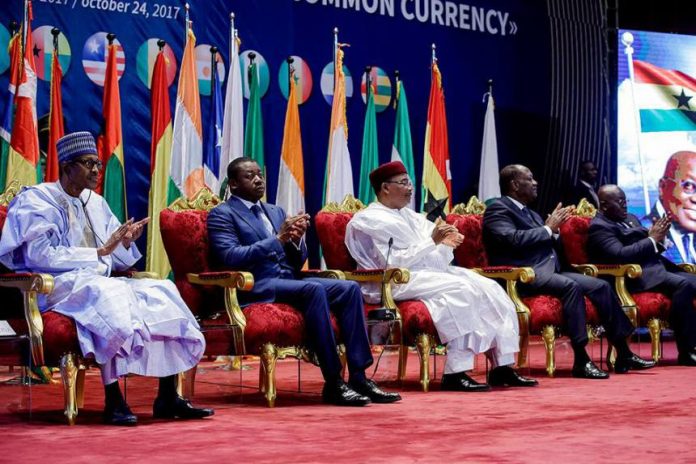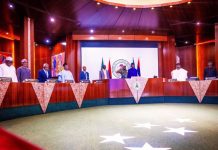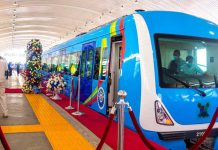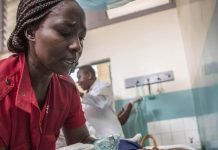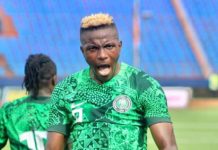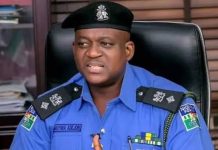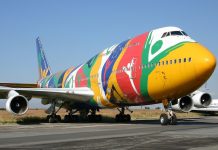Nigeria has said that it is not against the introduction of a common currency in the Economic Community of West African States, ECOWAS. But it is concerned about the need to make adequate arrangements before any deadline is selected for the take-off of the single currency plan. President Muhamadu Buhari made this clear during the week in Niamey, capital of Niger Republic, where he urged ECOWAS member-countries to tread carefully in pushing for a single currency in the sub-region by 2020, drawing attention to the challenges which the European Union faced in achieving the same goal.
Addressing the 4th Meeting of the Presidential Task Force on the ECOWAS Currency Programme, President Buhari said the necessary economic fundamentals among countries continue to differ over the years, making it more difficult to pull through with the project by 2020. He pointed out that Nigeria would caution against any position that pushes for a fast-track approach to the monetary union, while neglecting fundamentals and other pertinent issues.
President Buhari listed some of the obstacles towards realizing the implementation of a single currency to include diverse and uncertain macro – economic fundamentals of many countries, unrealistic inflation targeting based on flexible exchange rate regime and inconsistency with the African Monetary Co-operation Programme.
According to the Nigerian helmsman, “although the ECOWAS Commission has anchored its pursuit of the new impetus to monetary integration on the information presented to the Heads of State which were the basis for their recommendations, the sub-region should be concerned that it has not properly articulated and analyzed a comprehensive picture of the level of preparedness of individual countries for monetary integration in ECOWAS by 2020.
President Buhari declared, “In previous meetings, we had specifically raised observations on the state of preparedness of the member states, the credibility of the union if anchored on watered down criteria, and the continuing disparities between macroeconomic conditions in ECOWAS countries, amongst others. And I would like to reiterate these concerns.’’
The President told the Heads of State that the conditions that pushed Nigeria into withdrawing from the process in the past had not changed. “Nigeria had earlier withdrawn from the process because its key questions and concerns were ignored and till date, none of the issues has come up as an agenda issue to be considered by the Taskforce. Consequently, the Roadmap which did not involve widespread consultation with national stakeholders is not sufficiently inclusive,’’ he explained.
President Buhari suggested a thorough review of the convergence roadmap and the constitution of an expert committee on each of the subject areas to come up with acceptable time frame, defined cost and funding sources identified. “This should also consider stakeholders such as the Ministries of Finance, Customs, Parliamentary groups, Tax Authorities, Immigration authorities to achieve comprehensiveness,’’ he said.
The Nigerian leader cited the need for a push towards ratification and domestication of legal instruments and related protocols, while fiscal, trade and monetary policies and statistical systems, which had not gone far, could be harmonized. He suggested that the West African Economic and Monetary Union (UEMOA) should make a clear presentation on a roadmap towards delinking from the French Treasury.
President Buhari also advised an examination of the African Union position on the same issue, which the African Central Bank Governors, in line with the African Union programme of monetary convergence, recommended a convergence deadline of 2034 for the establishment of Regional Central Banks in all sub-regions.
In his remarks, the President of the ECOWAS Commission, Marcel Alain de Souza, said the single currency for the West African sub-region was a laudable and historical project, but regretted that it had taken too long to be actualized. Mr. De Souza said the creation of a Central Bank for the West Coast would accelerate the process, pointing out that Nigeria constitutes more than 70 percent of the GDP of the West African region, with a population of 180 million, and would play a significant role in facilitating the process of realizing a single currency for the sub-region.






